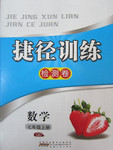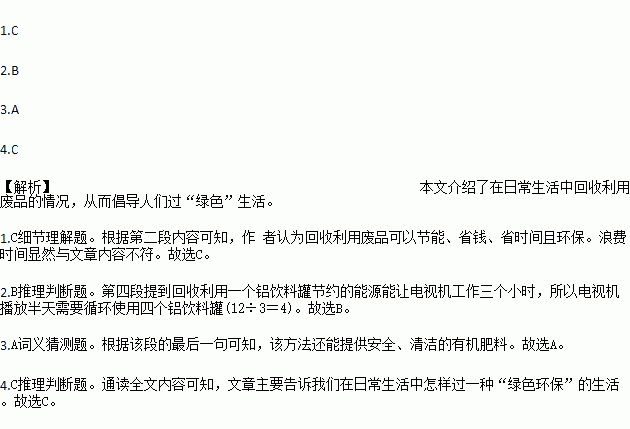题目内容
A new set of R's are here: Recycle, Reduce and Reuse. These three “Rs”,when used every day, can reduce the amount of waste going into landfills, reduce the litter polluting the land and water, conserve (节约) energy and save your money.
Recycling is one of the easiest ways to save energy, money and time while reducing the amount of garbage going into landfills.
Most communities have roadside pick?up service to recycle common household items like glass, steel, aluminum, newspaper and cardboard. By separating out the recyclable items from normal household trash, you can reduce the amount of trash entering a landfill by more than 75 percent.
Recycling one aluminum beverage can saves enough energy to run your television for three hours. Even better, local recyclers or scrap?metal dealers may pay money for your metal recyclables.
It is estimated that the 54 billion cans recycled last year in the US saved 15 million barrels of oil. That is equivalent (相等的) to the US oil consumption for one day. Recycling other household items offers similar savings in money and energy.
Composting food waste will reduce your trash load even more. A basic compost pile built with the help of instructions from numerous resources on the web can be constructed over a weekend, using materials easily obtained from local hardware or home improvement stores. In addition to reducing your waste, this all?natural recycling provides safe, clean and organic fertilizer for your garden, eliminating the need to buy chemical?derived products.
Finally, recycling other household items like computers, televisions and monitors and household chemicals like pesticides (农药) and paints will remove dangerous chemicals like mercury (水银) and lead from the landfills.
If your community doesn't offer recycling programs, contact your local government to get one established.
1.What's NOT true about recycling in the eyes of the author?
A. It's energy?efficient.
B. It's money?saving.
C. It's time?consuming.
D. It's environmentally?friendly.
2.Recycling________aluminum beverage cans save enough energy to keep your TV on for half a day.
A. three B. four
C. five D. six
3.What's the possible meaning of the underlined word “composting” in the sixth paragraph?
A. Turning waste into fertilizer.
B. Throwing waste into dustbin.
C. Making waste clean and useful.
D. Finding new land to put the rubbish in.
4.The passage tells us the way of living a ________life.
A. happy B. rich
C. green D. economical
 捷径训练检测卷系列答案
捷径训练检测卷系列答案 小夫子全能检测系列答案
小夫子全能检测系列答案
